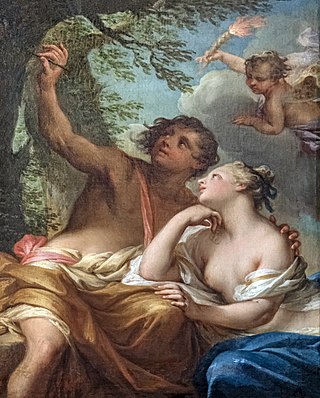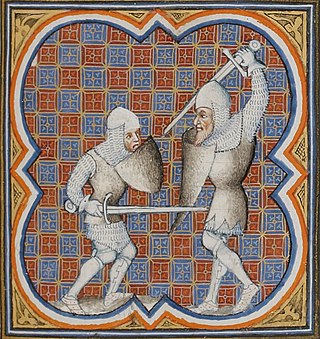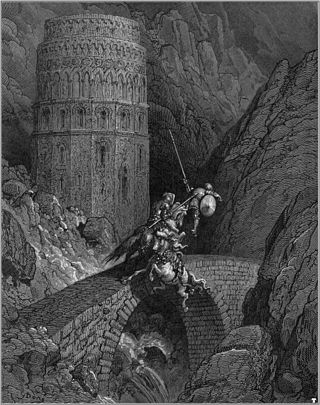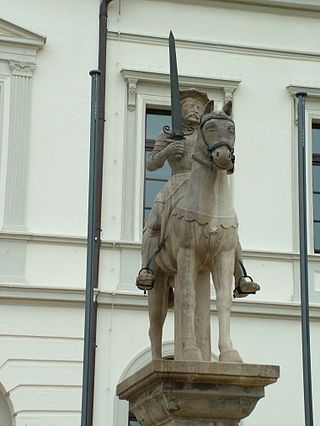Related Research Articles

Ludovico Ariosto was an Italian poet. He is best known as the author of the romance epic Orlando Furioso (1516). The poem, a continuation of Matteo Maria Boiardo's Orlando Innamorato, describes the adventures of Charlemagne, Orlando, and the Franks as they battle against the Saracens with diversions into many sideplots. The poem is transformed into a satire of the chivalric tradition. Ariosto composed the poem in the ottava rima rhyme scheme and introduced narrative commentary throughout the work.

Orlando furioso is an Italian epic poem by Ludovico Ariosto which has exerted a wide influence on later culture. The earliest version appeared in 1516, although the poem was not published in its complete form until 1532. Orlando furioso is a continuation of Matteo Maria Boiardo's unfinished romance Orlando innamorato. In its historical setting and characters, it shares some features with the Old French Chanson de Roland of the eleventh century, which tells of the death of Roland. The story is also a chivalric romance which stemmed from a tradition beginning in the late Middle Ages and continuing in popularity in the 16th century and well into the 17th.

Renaudde Montauban was a legendary hero and knight which appeared in a 12th-century Old French chanson de geste known as The Four Sons of Aymon. The four sons of Duke Aymon are Renaud, Richard, Alard and Guiscard, and their cousin is the magician Maugris. Renaud possesses the magical horse Bayard and the sword Froberge.

Orlando, usually known in modern times as Orlando furioso, is an opera in three acts by Antonio Vivaldi to an Italian libretto by Grazio Braccioli, based on Ludovico Ariosto's epic poem Orlando Furioso. The first performance of the opera was at the Teatro San Angelo, Venice, in November 1727. It is to be distinguished from an earlier Vivaldi opera of 1714, Orlando furioso, set to much the same libretto, once thought to be a revival of a 1713 opera by Giovanni Alberto Ristori but now considered by Vivaldian musicologists to be a fully-fledged opera by Vivaldi himself.

Orlando is an opera seria in three acts by George Frideric Handel written for the King's Theatre in London in 1733. The Italian libretto was adapted from Carlo Sigismondo Capece's L'Orlando after Ludovico Ariosto's Orlando Furioso, which was also the source of Handel's operas Alcina and Ariodante. More an artistic than a popular success at its first performances, Orlando is today recognised as a masterpiece.

Oliver, sometimes referred to as Olivier de Vienne or de Gennes, is a legendary knight in the Matter of France chansons de geste, especially the French epic The Song of Roland. In the tradition, he was Roland's closest friend, advisor, confidant and brother-in-law to be, one of Charlemagne's twelve peers and brother of Aude, Roland's betrothed. He dies with Roland at the Battle of Roncevaux Pass. Some critics have linked his name to the olive tree, a biblical symbol of divine wisdom.

Atlantes was a powerful sorcerer featured in chansons de geste. In Boiardo's Orlando Innamorato (1482), where he is known as Atalante, the magician fears that Rugiero will convert to Christianity and aid Charlemagne against the Saracens. To prevent this and forestall Rugiero's death, he constructs a magic garden ringed by glass on Mt. Carena in the Atlas Mountains, after which he is named. In Orlando Furioso, Atlantes' magical castle is filled with illusions, in order to divert Ruggiero from what he has foretold as certain doom. Ruggiero is later set free by Bradamante and after numerous trials and quests sires a great line of heroes. He later dies betrayed fulfilling the destiny foretold by Atlantes.

Ferragut was a character—a Saracen paladin, sometimes depicted as a giant—in texts dealing with the Matter of France, including the Historia Caroli Magni, and Italian epics, such as Orlando Innamorato by Matteo Maria Boiardo and Orlando Furioso by Ludovico Ariosto. In the tales, he was portrayed as physically invulnerable except at his navel/stomach, and was eventually killed by the paladin Roland.

Rodomonte is a major character in the Italian romantic epic poems Orlando innamorato by Matteo Maria Boiardo and Orlando furioso by Ludovico Ariosto. He is the King of Sarza and Algiers and the leader of the Saracen army which besieges Charlemagne in Paris. He is in love with Doralice, Princess of Granada, but she elopes with his rival Mandricardo. He tries to seduce Isabella but she tricks him into killing her by mistake. In remorse, Rodomonte builds a bridge in her memory and forces all who cross it to pay tribute. When the "naked and mad" Orlando arrives at the bridge, it is Rodomonte, the pagan, who throws him into the river below. They both swim ashore, but Orlando who is naked and is unimpeded by heavy armor gets to the shore first. Finally, Rodomonte appears at the wedding of Bradamante and Ruggiero and accuses Ruggiero of treason for converting to Christianity and abandoning the Saracen cause. The two fight a duel and Rodomonte is killed.

Ruggiero is a leading character in the Italian romantic epics Orlando Innamorato by Matteo Maria Boiardo and Orlando Furioso by Ludovico Ariosto. Ruggiero had originally appeared in the twelfth-century French epic Aspremont, reworked by Andrea da Barberino as the chivalric romance Aspramonte. In Boiardo and Ariosto's works, he is supposed to be the ancestor of Boiardo and Ariosto's patrons, the Este family of Ferrara, and he plays a major role in the two poems.
Brunello is a character in the Italian romantic epics Orlando innamorato by Matteo Maria Boiardo and Orlando furioso by Ludovico Ariosto. Brunello is a dwarf and a cunning thief who works for the Saracen army of King Agramante. He first appears in the second book of Orlando innamorato where Agramante intends to invade Europe and defeat the Emperor Charlemagne. He has been told he has no chance of success unless he has the young warrior Ruggiero on his side, but Ruggiero has been hidden in a secret garden by the wizard Atlante and the only way to reach him is by using the magic ring belonging to Princess Angelica. Brunello undertakes to steal it and sets off for the fortress of Albracca where not only does he manage to snatch the ring but also robs King Sacripante of his horse and the female warrior Marfisa of her sword. Marfisa sets off in pursuit but Brunello evades her and gives the ring to Agramante, who rewards him with a kingdom. The Saracens find Ruggiero at Mount Carena where they see him behind a wall of glass. However, the wall is too steep and slippery to climb, so Brunello suggests they trick Ruggiero out. He gets them to play war games in the plain beneath the mountain. Ruggiero, with his inherent love of combat, cannot resist and in spite of Atlante's pleas he leaves the garden and begs Brunello for his horse and armour. Brunello only agrees if he will join their expedition against France, to which Ruggiero happily consents.

Marfisa is a character in the Italian romantic epics Orlando innamorato by Matteo Maria Boiardo and Orlando Furioso by Ludovico Ariosto. She is the sister of Ruggiero but was separated from him in early childhood. She becomes queen of India and fights as a warrior for the Saracens, taking part in the siege of the fortress Albracca until her sword is stolen by Brunello. She falls in love with Ruggiero, unaware who he is until Atlantes reveals their background. Learning that her parents were Christian, she converts to the faith and joins the Emperor Charlemagne's army against the Saracens.
Sacripante is a character in the Italian romantic epics Orlando innamorato by Matteo Maria Boiardo and Orlando furioso by Ludovico Ariosto. Sacripante is the King of Circassia and one of the leading Saracen knights. He is passionately in love with Angelica and fights to defend her when she is besieged in the fortress of Albracca. His horse Frontino is stolen from underneath him by the cunning thief Brunello. In Orlando furioso he offers to become the wandering Angelica's protector but she evades him.
Agolant or Agolante is a fictional character in Medieval and Renaissance romantic epics dealing with the Matter of France, including Orlando innamorato by Matteo Maria Boiardo and Orlando furioso by Ludovico Ariosto. He is a Saracen king from Africa.

Veillantif (French), Vielantiu ; Vegliantin, Vegliantino or Brigliadoro (Italian) is the name of Roland the paladin's trustworthy and swift steed in the stories derived from the chansons de geste. The French name comes from an expression meaning "vigilant". Veillantif is first mentioned in The Song of Roland.
Brandimarte is a fictional character of the Matter of France. He appears in Matteo Maria Boiardo's Orlando Innamorato and Ludovico Ariosto's Orlando Furioso. He is a Saracen knight who was baptized by Orlando and became his loving friend. He took part in the siege of Biserta. Orlando, Oliver, and Brandimarte were the three companions who took part in the final combat on Lampedusa, where he was killed by Gradasso.

Melissa is a fictional good sorceress in the Matter of France. She is said to have been an apprentice of Merlin and guards his tomb, though she does not appear in older stories about him.
Albracca is a major city of Cathay in the Italian romantic epics Orlando innamorato by Matteo Maria Boiardo and Orlando furioso by Ludovico Ariosto. In the story it is the walled city and fortress where Angelica and the knights she has befriended make their stand when attacked by Agrican, emperor of Tartary.

Angelica and the Hermit is a 1626–1628 painting by Peter Paul Rubens. It shows an episode from canto 8 of Ludovico Ariosto's poem Orlando Furioso. It is now in the Kunsthistorisches Museum in Vienna.

Mandricardo is a character from the Matter of France, featured in the Italian romantic epic poems Orlando innamorato by Matteo Maria Boiardo and Orlando furioso by Ludovico Ariosto.
References
- Orlando Furioso, prose translation by Guido Waldman (Oxford, 1999). ISBN 0-19-283677-3.
- Orlando Furioso, verse translation by Barbara Reynolds in two volumes (Penguin Classics, 1975). Part one (cantos 1-23) ISBN 0-14-044311-8; part two (cantos 24–46) ISBN 0-14-044310-X. Part one has since been reprinted.
- Orlando furioso ed. Marcello Turchi (Garzanti, 1974)
- Orlando Furioso: A Selection ed. Pamela Waley (Manchester University Press, 1975)